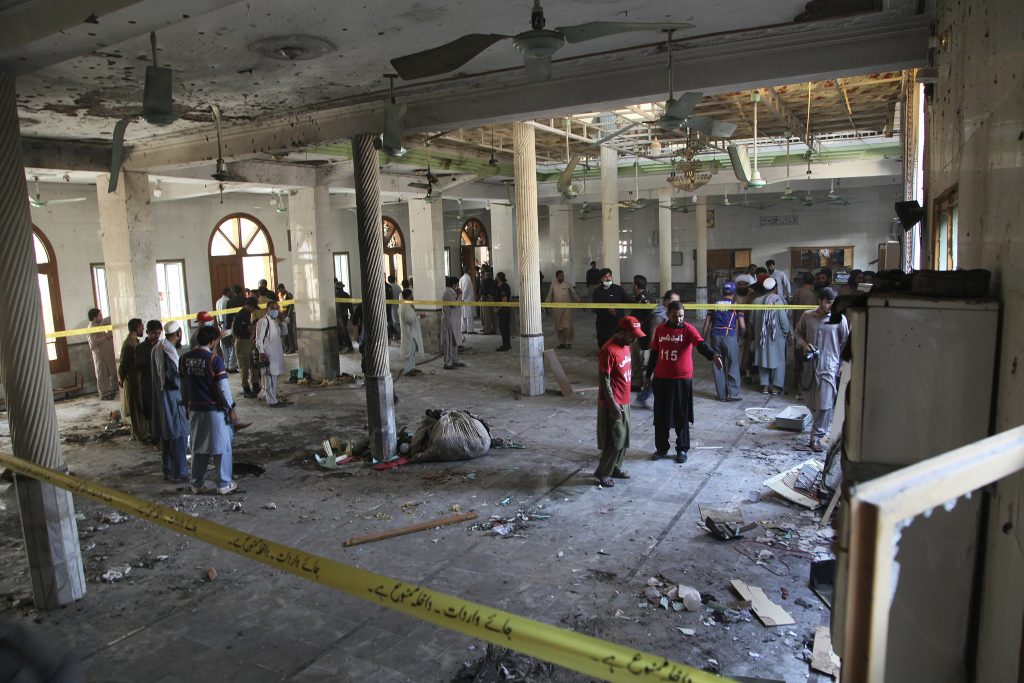Editor’s note: A previous version of this story said children were among the dead, based on a statement from the local hospital director who has since said no children were killed. The story has been updated to reflect the new information.

A powerful bomb blast ripped through an Islamic seminary on the outskirts of the northwest Pakistani city of Peshawar on Tuesday morning, killing at least eight students and wounding 136 others, police and a hospital spokesman said.
The bombing happened as a prominent religious scholar during a special class was delivering a lecture about the teachings of Islam at the main hall of the Jamia Zubairia madrassa, said police officer Waqar Azim. He said initial investigations suggest the bomb went off minutes after someone left a bag at the madrassa.
TV footage showed the damaged main hall of the seminary, where the bombing took place. The hall was littered with broken glass and its carpet was stained with blood. Police said at least five kilograms (11 pounds) of explosives were used in the attack.
Several of the wounded students were in critical condition, and hospital authorities feared the death toll could climb further. Authorities said some seminary teachers and employees were also wounded in the bombing.
Initially, police said the bombing killed and wounded children studying at the seminary but later revised their account to say that the students were in their mid-20s.
Shortly after the attack, residents rushed to the seminary to check up on their sons or relatives who were studying there. Many relatives were gathering at the city’s main Lady Reading Hospital, where the dead and wounded students were brought by police in ambulances and other vehicles.

Get daily National news
Some Afghan students studying at the seminary were also among the wounded, officials said.
Pakistani Prime Minister Imran Khan condemned the bombing and asked authorities to ensure the provision of best possible medical aid to the victims.

“I want to assure my nation we will ensure the terrorists responsible for this cowardly barbaric attack are brought to justice,” Khan said.
The bombing drew condemnation from the country’s opposition party, which has been holding rallies meant to force Khan’s government to quit.
From his hospital bed, a wounded student, Mohammad Saqib, 24, said religious scholar Rahimullah Haqqani was explaining verses from the Quran when suddenly they heard a deafening sound and then cries and saw blood-stained students crying for help.
“Someone helped me and put me in an ambulance and I was brought to hospital,” he said. Saqib had bandages on both arms but he was listed in a stable condition.
Another witness, Saeed Ullah, 24, said up to 500 students were present at the seminary’s main hall at the time of the explosion. He said teachers were also among those who were wounded in the bombing.
A video filmed by a student at the scene showed the Islamic scholar Haqqani delivering a lecture when the bomb exploded. It was unclear whether the teacher was among the wounded.
Mohammad Asim, a spokesman at the Lady Reading Hospital, said eight students died and they received dozens of wounded people, mostly seminary students.
The attack comes days after Pakistani intelligence alerted that militants could target public places and important buildings, including seminaries and mosques across Pakistan, including Peshawar.
No one immediately claimed responsibility for the attack in Peshawar which is the provincial capital of Pakistan’s Khyber Pakhtunkhwa province bordering Afghanistan. The province has been the scene of such militant attacks in recent years, but sectarian violence has also killed or wounded people at mosques or seminaries across Pakistan.
The latest attack comes two days after a bombing in the southwestern city of Quetta killed three people. The Pakistani Taliban have been targeting public places, schools, mosques and the military across the country since 2001, when this Islamic nation joined the U.S.-led war on terror following the Sept. 11 attacks in the United States.
Mohammad Khurasani, a spokesman for the Pakistani Taliban, condemned Tuesday’s bombing. In a statement, he described the attack as a cowardly act, claiming that the country’s institutions were behind it.
Since then, the insurgents have declared war on the government of Pakistan and have carried out numerous attacks, including a brutal assault on an army-run school in the city of Peshawar in 2014 that killed 140 children and several teachers.







Comments
Want to discuss? Please read our Commenting Policy first.